Fifpro study shows players suffer more mental issues than public
- Published
'We have a duty of care to players'
Current and former professional footballers suffer more from symptoms of depression and anxiety than the general public, according to a study.
Of the 826 who completed players' union Fifpro's questionnaire, 38% of current players and 35% of ex-professionals said they suffered with problems.
Half of those questioned played or play at the highest level in their country.
Fifpro's Vincent Gouttabarge said: "This awareness might allow the early treatment of such health conditions."
Chief medical officer Gouttabarge admitted "a lot of players are struggling" and that it would be "difficult to reach players in the upcoming months".
He added: "We are putting something together, a plan in order to implement measures in order to teach them how to cope. It's not feasible in weeks or months."
Gouttabarge said that academies should ensure young players are given a "proper education to life after football".
Another of the findings is that current players who have suffered three or more severe injuries are four times more likely to report mental health problems than other players.
Former New Zealand captain Chris Jackson spoke at the presentation of the Fifpro report, and in an interview with the union said he had been suffering from mental health issues for decades.
"It was quite humbling to know so many players at the top level have experienced this huge hidden issue," said the 45-year-old.
"Most are still trying to deal with it to this day, battling through everyday life. Knowing there were others in the same boat made me realise I was not doing this all by myself."
The findings were released on the day retired footballer Clarke Carlisle told the BBC that some sports are "failing to address" the issue of mental health.
The former Burnley and QPR player, 35, tried to take his own life in December 2014 while severely depressed.
'I tried to end it all, I tried to take my life'
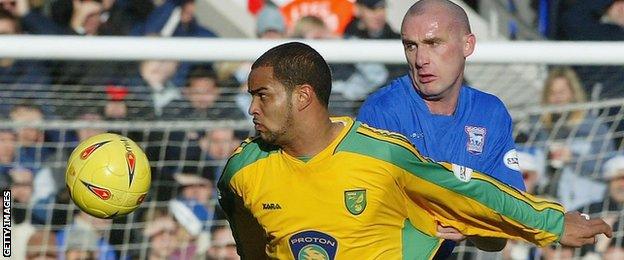
Leon McKenzie played for Norwich from 2003 to 2006
Leon McKenzie, former professional footballer turned boxer: "I lost my sister aged 23 and didn't really understand the circumstances of depression. It was only when things changed in my life that I started to become shut off.
"I didn't turn to anyone. I am lucky to be here today. When I was playing at Charlton, I tried to end it all, I tried to take my life. I went in for training the next day and didn't say a word. Even the doctors that spoke to me after I came around just let me go. Things did get even worse after that.
"The Gary Speed incident happened,, external which was sad and a tragedy, but what alarmed me at the time was that it took someone high profile for people to open their eyes and start listening. There is such a big percentage of sportsmen and those around the world struggling, it shouldn't take that."
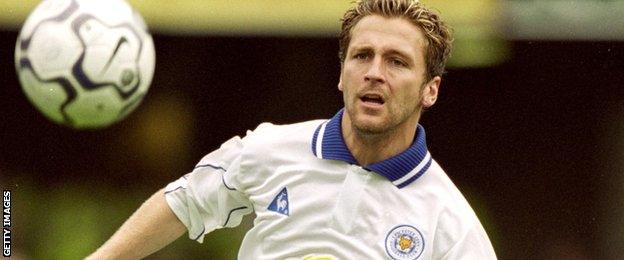
Darren Eadie also played for Leicester City before he was forced to retire, aged 28, in 2003
Darren Eadie, former Norwich City player: "I always had injury problems. I had 26 operations on my knee, one on my neck and one on my cheekbone, but I always came back form those injuries. To then be awoken from an operation and be told your career is finished, you can never really prepare for it. It was a huge shock.
"These things build up over years. My mum had been diagnosed with breast cancer. It had all been building up inside, I'd never really talked to anyone about it and I just broke down. There are just triggers and it can happen to anyone at any time.
"It was never about the money, it was about not being able to play the game any more."
Vincent Pericard, former Portsmouth and Stoke striker: "In my case I would probably say I suffered the whole of my professional career, from the moment I arrived at Portsmouth in 2002 until when I retired 10 years later.
"It was unfortunate because as everyone knows I had a lot of potential but I was unable to fulfil it and in my case it was too late. Things have changed but unfortunately they haven't changed drastically enough.
"A lot of good work has been done around tackling the stigma surrounding mental health. Players feel a lot more confident and the great work done by the likes of Clarke Carlisle means it's easier for players to come out and say they have an issue. However, on the other hand, it's the pressure of performing on a Saturday and when the club puts more pressure on you to win games."
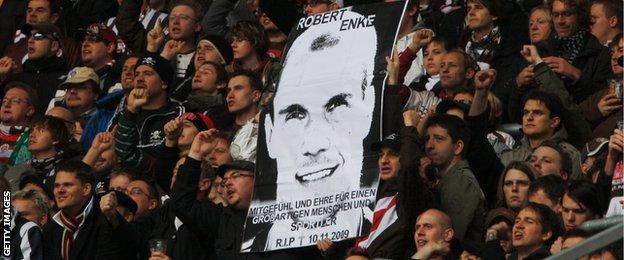
Hannover 96 goalkeeper Robert Enke took his own life in 2009
Former Inter Milan youth player Martin Bengtsson tried to commit suicide 10 months after joining the Italian club's academy because of his depression.
He said he is "very frustrated" that the issue of raising awareness around mental health in football is "on a loop".
He added: "I'm not surprised that these numbers have come up, it raises the question of what kind of responsibility football clubs should take over a player and how long that should last after their careers.
"What was interesting is the connection to injuries, I had one five or six months before my suicide attempt. I think the depression increased during this period because for me it was the first time I couldn't play football
"When you can't do it you lose your worth, your self-confidence, you value yourself only by what you can do on the football pitch.
"It's strange that teams on high levels miss a therapist out. Some of them have people working on the mental side, but it's then about visualising how to perform better. I'm talking about working with other questions that are more existential, those that will be appropriate when you leave this arena of applause and of fame."
- Published6 October 2015
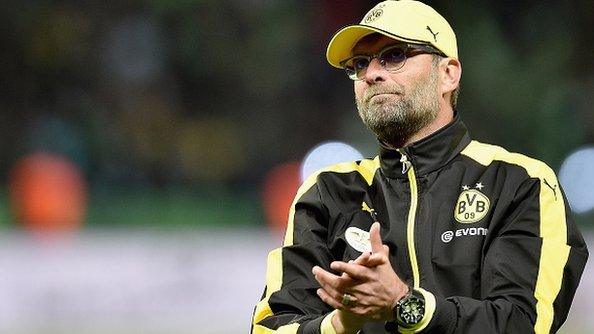
- Published6 October 2015
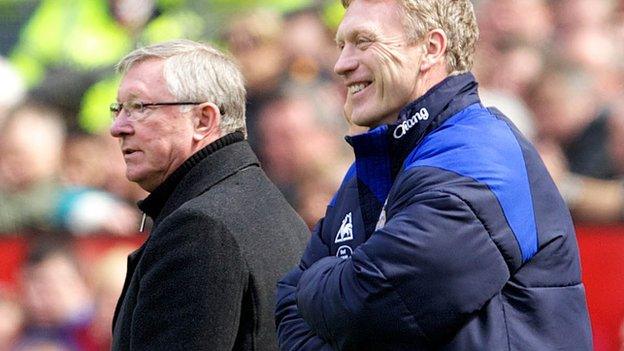
- Published5 October 2015
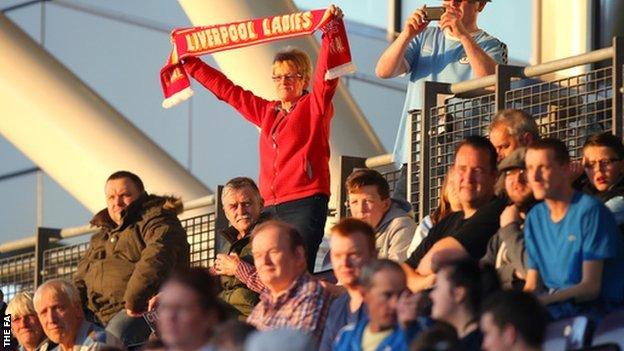
- Published20 June 2016

- Published2 November 2018
